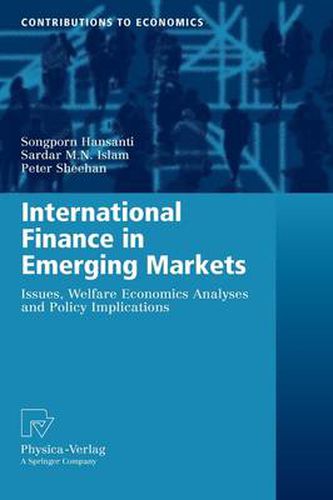Readings Newsletter
Become a Readings Member to make your shopping experience even easier.
Sign in or sign up for free!
You’re not far away from qualifying for FREE standard shipping within Australia
You’ve qualified for FREE standard shipping within Australia
The cart is loading…






This title is printed to order. This book may have been self-published. If so, we cannot guarantee the quality of the content. In the main most books will have gone through the editing process however some may not. We therefore suggest that you be aware of this before ordering this book. If in doubt check either the author or publisher’s details as we are unable to accept any returns unless they are faulty. Please contact us if you have any questions.
This book reviews the contemporary issues in international monetary and financial economics (such as financial liberalisation, crisis, exchange rate determination, capital control, domestic capital market reform, etc.) in an emerging financial market such as Thailand from a welfare economic p- spective, highlighting the social welfare implications of these issues. This 3 book also suggests a normative social approach (as formalised in the new welfare economics paradigm) (see Islam 2001a,b for a discussion of this ; concept) for analysing and addressing these issues and formulating appr- riate policies. Undertaking the above tasks, the asymmetric information paradigm 3 and other elements of the new welfare economics paradigm are adapted in analysing the international financial issues of Thailand, their causes and economic and social welfare consequences. The last two decades have been a critical period for Thailand’s dev- opment. From the mid-1980s to the beginning of the 1990s, the Thai economy performed remarkably well and was a showcase for the world economy. Having achieved a double-digit growth rate for a brief period, Thailand in the late 1980s was regarded as the fastest growing economy in the world by the World Bank and the IMF. With prospects of further rapid economic growth, the Thai government accepted Article VIII of the IMF, which required Thailand to liberalise and deregulate its financial system.
$9.00 standard shipping within Australia
FREE standard shipping within Australia for orders over $100.00
Express & International shipping calculated at checkout
This title is printed to order. This book may have been self-published. If so, we cannot guarantee the quality of the content. In the main most books will have gone through the editing process however some may not. We therefore suggest that you be aware of this before ordering this book. If in doubt check either the author or publisher’s details as we are unable to accept any returns unless they are faulty. Please contact us if you have any questions.
This book reviews the contemporary issues in international monetary and financial economics (such as financial liberalisation, crisis, exchange rate determination, capital control, domestic capital market reform, etc.) in an emerging financial market such as Thailand from a welfare economic p- spective, highlighting the social welfare implications of these issues. This 3 book also suggests a normative social approach (as formalised in the new welfare economics paradigm) (see Islam 2001a,b for a discussion of this ; concept) for analysing and addressing these issues and formulating appr- riate policies. Undertaking the above tasks, the asymmetric information paradigm 3 and other elements of the new welfare economics paradigm are adapted in analysing the international financial issues of Thailand, their causes and economic and social welfare consequences. The last two decades have been a critical period for Thailand’s dev- opment. From the mid-1980s to the beginning of the 1990s, the Thai economy performed remarkably well and was a showcase for the world economy. Having achieved a double-digit growth rate for a brief period, Thailand in the late 1980s was regarded as the fastest growing economy in the world by the World Bank and the IMF. With prospects of further rapid economic growth, the Thai government accepted Article VIII of the IMF, which required Thailand to liberalise and deregulate its financial system.